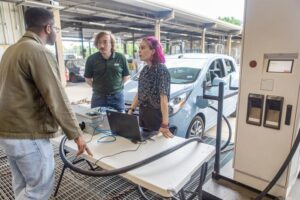Unlocking prosperity through engineering across the UK
New report and interactive dashboard from Royal Academy of Engineering offers detailed picture of role of engineering in local economies, and seeks to help local policymakers address inequality and unlock prosperity.
Engineering comprises some 32% of total national economic output and 26% of jobs nationally. But, warns the new report Engineering Economy & Place, without a place-based approach to engineering policy, we risk hampering economic growth.
The report has been produced by the Royal Academy of Engineering and Metro Dynamics, and goes beyond traditional sectoral analysis to describe how much, what type, where and in what context engineering is happening across the country.
The South East is home to some of the strongest local engineering economies that generate high value but the report shows several places across the Midlands, North West and Scotland performing above average. High-value engineering is also being done in South Derbyshire, North Warwickshire and the Ribble Valley, including in information and communication technologies and scientific and technical activities.
The report also identifies hotspots of engineering all over the UK, not just in major cities. Mid Ulster, West Cumbria, Flintshire and Wrexham, West Lothian, and Aberdeen and Aberdeenshire boast the highest proportion of local population employed in engineering.
High concentrations of R&D employment are found across London, the South East and the Oxford-Cambridge arc. Outside these areas, concentrations are found largely in cities, including Edinburgh, Belfast, Manchester and Brighton, and some smaller concentrations in the East Midlands, Cheshire and the South West.
The report recommends improving the connectivity between rural areas with thriving engineering enterprises, such as Flintshire, South Cambridgeshire, Aberdeenshire and Bedfordshire, and their wider city-regions.
Of course, engineering impacts multiple sectors, from manufacturing, software and R&D to engineers in non-engineering industries such as financial services and media. It’s hoped that the new data provided in the report can inform future policy decisions to better share the benefits of engineering across society and help achieve UK ambitions in engineering, science and technology ambitions.
Other findings of the report include:
- The engineering economy contributes some £646bn direct Gross Value Added to the UK economy each year.
- Engineering jobs comprise a wide range of sectors and activities. Of 8.1m people in the UK employed by the engineering economy, 5.7m (70%) are engineers and 2.4m work in non-engineering roles in an engineering business.
In addressing what can be done to enhance the sector, the report says targeted support from government and local authorities is needed to maximise the potential of areas with highly specialised industrial concentrations but where there are weaker economic and enterprise environments. These are frequently, but not exclusively, in coastal town communities.
Also, places with a lot of applied engineering jobs could be vulnerable to automation that takes over technical production and standardised operation roles. The report concludes that government and business must ensure that new technologies lead to the creation of new jobs and the enhancement of employment opportunities.
Professor Sir Jim McDonald FREng FRSE, President of the Royal Academy of Engineering says: ‘Engineering is at the core of the UK’s industrial DNA – it is no wonder that we have a proud history of innovation. This snapshot of the current engineering landscape shows that engineers are drivers of economic opportunity – from R&D to delivering products and services that generate jobs, drive our economy and create value for society.
‘The UK simply cannot become a science and technology superpower without first becoming an engineering superpower. Without a place-based approach to engineering policy, the UK risks maintaining the status quo that currently hinders the potential of its economy – with regional imbalance, city centres disconnected from surrounding areas and untapped capacity for innovation and production.
‘The report highlights that additional support for enterprise infrastructure across the country is essential for the benefits of engineering innovation to be shared more evenly. Our ambition is to expand our network of Enterprise Hubs to support engineering-led growth and opportunity in local communities and increase the number of engineering startups in those areas.
‘We hope that this new framework for analysing engineering’s contribution to our broader economy will be a useful tool to inform future policy and decision-making for local and national success.’
In related news:
22 ways to reduce emissions from the built environment by 75% – McKinsey
Urgent action to speed up electricity grid connections by up to 10 years

















Leave a Reply